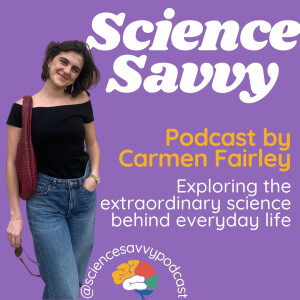
Tuesday Nov 26, 2024
You Are What You Eat: The Gut Microbiome Shapes Mood, Health, and Behavior
Welcome to the Gut Health episode, part of Science Savvy with Carmen. In this episode, I explore how your gut microbiome does so much more than support digestion. With my background in pharmacology and biomedical engineering, I break down the science behind the gut-brain connection and unpack how it shows up in your daily life.
This episode covers how gut bacteria influence your mood, mental health, immune function, and even decision-making. I share fascinating research on the relationship between the microbiome and depression, explain the biological pathways linking your gut to your brain, and offer practical tips for improving gut health through diet and lifestyle. Whether you're curious about probiotics, interested in the science of mood, or simply want to understand your body better, this episode offers clear and engaging insights grounded in real research.
Science Savvy helps you understand the systems shaping your thoughts, health, and behavior. If you're ready to explore your body and brain with a little more clarity, you're in the right place.
Further reading and references:
Bercik, P., & Collins, S. M. (2014). The effects of the microbiota on the central nervous system and behavioral disorders. Gastroenterology, 146(6), 1449-1458. https://doi.org/10.1053/j.gastro.2014.02.037
Cryan, J. F., & Dinan, T. G. (2012). Mind-altering microorganisms: The impact of the gut microbiota on brain and behaviour. Nature Reviews Neuroscience, 13(10), 701-712. https://doi.org/10.1038/nrn3346
Foster, J. A., Rinaman, L., & Cryan, J. F. (2017). Stress and the gut-brain axis: Regulation by the microbiome. Neurobiology of Stress, 7, 124-136. https://doi.org/10.1016/j.ynstr.2017.03.001
Mayer, E. A., Padua, D., & Tillisch, K. (2014). Altered brain-gut axis in autism: Comorbidity or causative mechanisms. BioEssays, 36(10), 933-939. https://doi.org/10.1002/bies.201400075
Clarke, G., Stilling, R. M., Kennedy, P. J., Stanton, C., Cryan, J. F., & Dinan, T. G. (2014). Minireview: Gut microbiota: The neglected endocrine organ. Molecular Endocrinology, 28(8), 1221-1238. https://doi.org/10.1210/me.2014-1108
Sampson, T. R., & Mazmanian, S. K. (2015). Control of brain development, function, and behavior by the microbiome. Cell Host & Microbe, 17(5), 565-576. https://doi.org/10.1016/j.chom.2015.04.011
O'Mahony, S. M., Clarke, G., Dinan, T. G., & Cryan, J. F. (2015). Early-life adversity and brain development: Is the microbiome a missing piece of the puzzle. Neuroscience, 342, 37-54. https://doi.org/10.1016/j.neuroscience.2015.09.068
Ridaura, V. K., et al. (2013). Gut microbiota from twins discordant for obesity modulate metabolism in mice. Science, 341(6150), 1241214. https://doi.org/10.1126/science.1241214
Dash, S., Clarke, G., Berk, M., & Jacka, F. N. (2015). The gut microbiome and diet in psychiatry: Focus on depression. Current Opinion in Psychiatry, 28(1), 1-6. https://doi.org/10.1097/YCO.0000000000000117
Madra, M., & Ringel, Y. (2015). The role of probiotics in treating irritable bowel syndrome. Gastroenterology Clinics of North America, 44(1), 159-175. https://doi.org/10.1016/j.gtc.2014.11.013
Jacka, F. N., et al. (2017). A randomized controlled trial of dietary improvement for adults with major depression (the SMILES trial). BMC Medicine, 15, 23. https://doi.org/10.1186/s12916-017-0791-y
Staudacher, H. M., et al. (2017). Probiotic and prebiotic mechanisms to improve mental health via the gut-brain axis. Current Opinion in Pharmacology, 38, 69-77. https://doi.org/10.1016/j.coph.2018.03.008
Kong, X., et al. (2020). Probiotics supplementation during antibiotic treatment reduces the risk of Clostridium difficile-associated diarrhea. The American Journal of Gastroenterology, 115(6), 921-929. https://doi.org/10.14309/ajg.0000000000000601
Mills, J. P., et al. (2017). The impact of cesarean delivery on the diversity of the infant gut microbiome. Microbial Ecology in Health & Disease, 28(1), 13777. https://doi.org/10.1080/16512235.2017.13777
No comments yet. Be the first to say something!